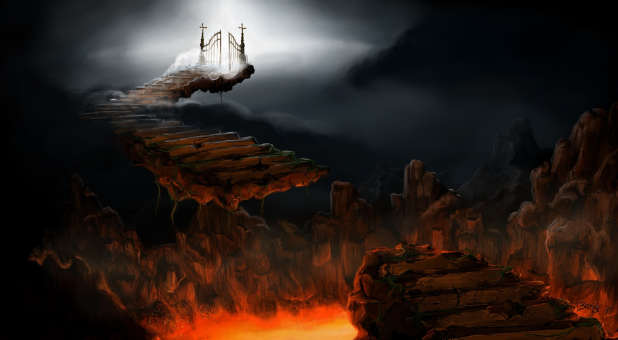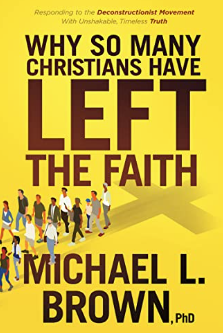There Is a Problem If There Is No Hell
 We often hear people talk about “the problem of hell,” meaning, “How could a good God send billions of people to an eternal hell?” That is certainly a fair question. In fact, I devoted a chapter of my recent book on “Why So Many Christians Have Left the Faith” to that very issue. But have you ever asked yourself a very different question, namely, what if there was no future punishment at all? What kind of problems would that present?
We often hear people talk about “the problem of hell,” meaning, “How could a good God send billions of people to an eternal hell?” That is certainly a fair question. In fact, I devoted a chapter of my recent book on “Why So Many Christians Have Left the Faith” to that very issue. But have you ever asked yourself a very different question, namely, what if there was no future punishment at all? What kind of problems would that present?
To be sure, there are many specific questions that can be asked about the nature of future punishment. Does it consist of eternal conscious torment? Does it end in annihilation and final destruction? Is there a purgatory that some go through before going to heaven? Is the idea of hell in keeping with God’s goodness and love? What about devout people from other religions along with non-religious, kind-hearted people. What about them? And what about those who never heard the gospel at all? What happens to them?
These are all valid and fair questions, and in the relevant chapter in my recent book, I focused especially on the question of the nature of God. Who is the God of the Bible, and is the idea of future punishment compatible with the scriptural teaching that “God is love” (1 John 4:8)? (Spoiler alert: the answer is yes, future punishment is compatible with the love of God.)
But here I want to focus on the opposite question, namely, what if there was no hell or future punishment at all? What would that tell you about the nature of God?
I realize, of course, that some of you reading this don’t believe there is a God (or, if there is one, you don’t believe this deity has any interest or involvement in our personal lives). Others simply don’t believe in life after death.
You are certainly welcome to keep on reading (personally, I hope you will), but please understand that I’m not trying to prove the points I’m making here about the Lord and the afterlife. Instead, I’m presupposing that: 1) there is one God and only one God, and He is our Creator, our Redeemer and our Judge; 2) some things are morally right and some things are morally wrong, and we will be judged by God for our works (unless we have received mercy through faith and repentance in the death and resurrection of Jesus); 3) there will be future punishment for those who have not received forgiveness through the cross.
The main point I want to make is simple: if there was no afterlife and no future punishment (or future reward), then God would not be just. If people could get away with murder in this world—I mean that literally—living long, prosperous lives, despite their horrific crimes, then where is the justice? Where is the justice for a mass murderer like Mao? What about a monster like Hitler? So what if he committed suicide at the age of 56? Where is the balancing of the scales? Where is the payback?
The same Bible that tells us that God is love and that extols His mercy also speaks of Him as a judge who will do right (Gen. 18:25). Psalm 89:14 puts it all together in one verse, saying, “Righteousness and justice are the foundation of Your throne; love and faithfulness go before You.” This is all part of who the Lord is—and He is not in internal conflict. These attributes all work hand in hand.
What would we think of an earthly judge who let a serial rapist go free with a wink and a nod? Wouldn’t we be absolutely outraged, especially if that rapist had abused someone we loved?
How do we feel when we hear about religious leaders covering up sexual abuse cases, leaving the victims feeling guilty and unclean while the victimizers continue their “ministry” work? Where is the fairness in that?
Human history, to this moment, is replete with acts of unimaginable cruelty and savagery, much of it going unrequited in this world. Be assured that it will not go unrequited in the world to come! As it is written in Ecclesiastes, “Now all has been heard; here is the conclusion of the matter: Fear God and keep his commandments, for this is the duty of all mankind. For God will bring every deed into judgment, including every hidden thing, whether it is good or evil.” (Eccl. 12:13–14)
Do Some Christians Underestimate Demonic Activity?
Every hidden thing will come to light. That is a staggering thought. Does it bring you comfort or terror?
The reality is that it’s not just the Hitlers of this world who deserve judgment, although an incredibly evil man like Hitler will doubtless suffer much more extreme punishment than others.
Rather, all of us, outside of God’s grace, fall infinitely short of God’s perfect standards, which is why His offer of mercy, forgiveness and a totally clean slate is mind-boggling beyond belief (especially when it came at the cost of His Son). What grace!
The reality is that Judgment Day will be catastrophic for unrepentant evildoers.
The reality is that God will judge with perfect fairness and rightness.
 The reality is that, if we refuse His mercy in this world, we will receive exactly what we deserve in the world to come—and God knows how to calculate with precision.
The reality is that, if we refuse His mercy in this world, we will receive exactly what we deserve in the world to come—and God knows how to calculate with precision.
And the reality is that the same God who will judge the guilty will extend mercy and grace to the contrite and repentant. He will comfort the mourner. He will lift up the downcast. He will set the record straight.
So, while there are legitimate and fair questions to ask about the nature of future punishment, the fact that God will judge the guilty should give us encouragement and hope. One day the wicked will be destroyed, and “the righteous will shine like the sun in the kingdom of their Father” (Matt 13:43). What a day that will be!
Until then, may we spread the message of mercy and forgiveness to all who have ears to hear. Is there anything more urgent than that? {eoa}
Dr. Michael Brown (askdrbrown.org) is the host of the nationally syndicated Line of Fire radio program. His latest book is “The Political Seduction of the Church: How Millions of American Christians Have Confused Politics with the Gospel.” Connect with him on Facebook, Twitter or YouTube.














































